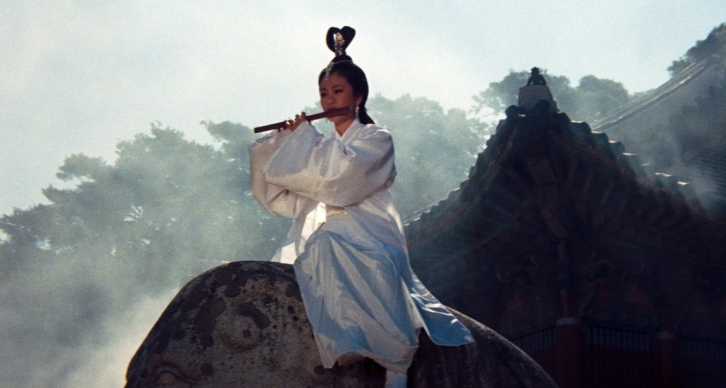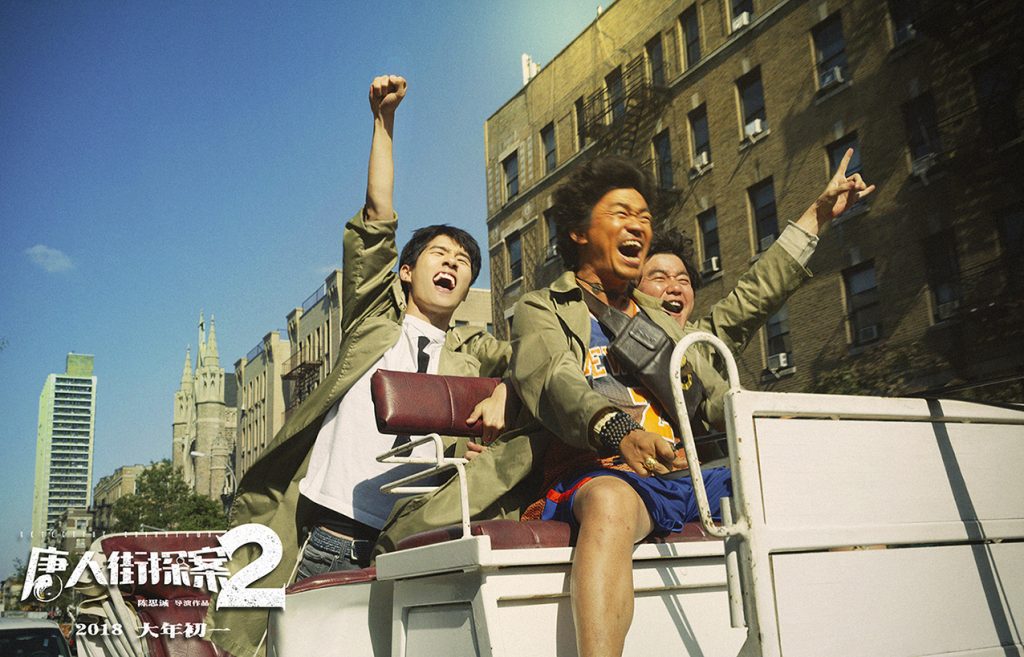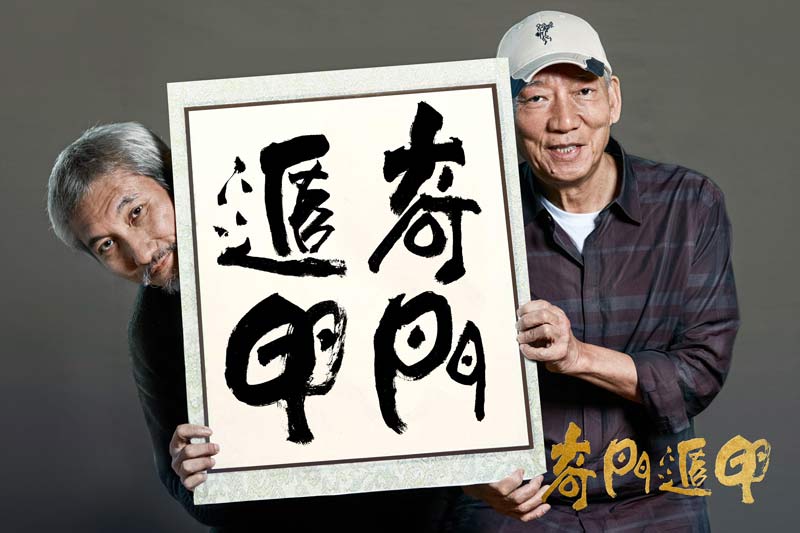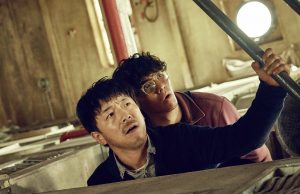Every day while CFI’s Hollywood readers take in the business of the Chinese film industry, the actual movies can sometimes seem exotic or remote. But in major US cities, mainstream Chinese films are increasingly available: thanks to Wanda’s purchase of AMC and distributors like China Lion, they get American theatrical releases practically simultaneous to their premieres at home. Though they receive virtually no publicity outside the non-Chinese community, these films are more than worth seeking out by anyone serious about engaging the Chinese industry, understanding the Chinese sensibility and familiarizing themselves with China’s talent pool. Periodically, CFI will review and point readers in the direction of noteworthy US releases of contemporary commercial and independent Chinese titles.
Scholar encounters the supernatural while copying sacred texts. Newly restored version of an influential King Hu adventure.

With films like Come Drink with Me and Dragon Inn, Taiwanese writer-director King Hu influenced a generation of Asian filmmakers. Legend of the Mountain, one of his later films, had a huge impact there as well. It is receiving its U.S. theatrical premiere in a sparkling new restoration.
Loosely based on Pu Songling’s horror collection Stories from a Chinese Studio, Hu’s script sends poor, naive scholar Ho Qingyun (Shih Chun) on a journey across mountains to a frontier fort to copy ancient sutras (a collection of chants and spells).
Ho’s journey is beautiful (Hu shot in the mountains of South Korea), but marked by increasingly odd incidents. When he arrives, the fort is almost abandoned, General Han’s troops having been killed in battle. Han’s advisor Tsui (Lin Tung) entertains Ho at dinner, getting the scholar drunk while elderly neighbor Wang (Rainbow Hsu) tries to persuade him to tutor her “naughty” child. Old Chang (Feng Tien), a nearly mute, gap-toothed servant, hangs around outside muttering.
It’s a classic setup for supernatural hijinks, and Hu stages the scene masterfully, playing up mistaken identities, double entendres, darting glances and slapstick as the parties get more and more inebriated. Wang’s “child” turns out to be the imposing, glamorous Melody (Feng Hsu, who helped finance this restoration), and by the time Ho comes to the next day, she’s his wife.
The next time Tsui and Ho go drinking, the scholar meets Cloud (Sylvia Chang, on the cusp of her Hong Kong career as director and star). She’s just as seductive and untrustworthy as Melody, which takes Ho a long time to understand.
Hu reveals the details of the trap surrounding Ho slowly. By copying the sutras, he will learn the “mudra” he needs to fight the supernatural forces threatening him. But as soon as he finishes, those forces will gain enormous power.
Like Kurosawa and Leone, Hu was inspired by world cinema, in particular westerns. He built a grammar from geometric imagery, oversized gestures and forceful editing, and used it to bring new life to traditional forms and stories. Legend of the Mountain is looser, funnier than his earlier wuxia films—and, at three hours, a bit of a commitment.
Brush up on your comparative religions as well. The movie’s chants and spells hinge on death and rebirth, and its debates and explanations can be convoluted. Long stretches of Legend of the Mountain detail drum battles between a lama and an evil master in control of several of the demons running through the story.
What Hu’s earlier films did for wuxia, Legend of the Mountain did for the supernatural, and its influence can still be felt in Hong Kong’s hopping vampire and ghost stories.
Click here for cast and crew information.
–This article originally appeared on Film Journal.
WHAT DOES THE GRADE MEAN?
Here are some recent & modern-era vintage Chinese and Hong Kong films for comparison
- A+
- PLATFORM (2000, dir Jia Zhangke)
- THE WORLD (2004, dir. Jia Zhangke)
- DRUNKEN MASTER 2 (1994, dir. Lau Kar Leung & Jackie Chan)
- KUNG FU HUSTLE (2004, dir. Stephen Chow)
- A
- LET THE BULLETS FLY (2010, dir Jiang Wen)
- THE MERMAID (2016, dir. Stephen Chow)
- A TOUCH OF SIN (2013, dir. Jia Zhangke)
- STILL LIFE (2006, dir. Jia Zhangke)
- MOUNTAINS MAY DEPART (2015, dir. Jia Zhangke)
- LITTLE BIG SOLDIER (2010, dir. Ding Sheng)
- EXTRAORDINARY MISSION (2017, dir. Alan Mak & Anthony Pun)
- MR SIX (2015, dir. Guan Hu)
- A WORLD WITHOUT THIEVES (2004, dir. Feng Xiaogang)
- SUZHOU RIVER (1999, dir. Lou Ye)
- HOUSE OF FLYING DAGGERS (2004, dir Zhang Yimou)
- RAISE THE RED LANTERN (1991, dir. Zhang Yimou)
- A-
- DUCKWEED (2017, dir. Han Han)
- I BELONGED TO YOU (2016, dir. Zhang Yibai)
- B+
- THE GREAT WALL (2016, dir. Zhang Yimou)
- OLD STONE (2016, dir. Johnny Ma)
- CRAZY STONE (2006, dir. Ning Hao)
- GO, LALA GO (2010, dir. Xu Jinglei)
- B
- KUNG FU YOGA (2017, dir. Stanley Tong)
- RAILROAD TIGERS (2016, dir. Ding Sheng)
- THE WASTED TIMES (2016, dir. Cheng Er)
- CHONGQING HOT POT (2016, dir. Yang Qing)
- MONSTER HUNT (2015, dir. Raman Hui)
- B-
- JOURNEY TO THE WEST: THE DEMONS STRIKE BACK (2017, dir. Tsui Hark)
- SOME LIKE IT HOT (2017, dir. Song Xiaofei & Dong Xu)
- BORN IN CHINA (2016, dir. Lu Chuan)
- D-
- TINY TIMES (2013, dir. Guo Jingming)







